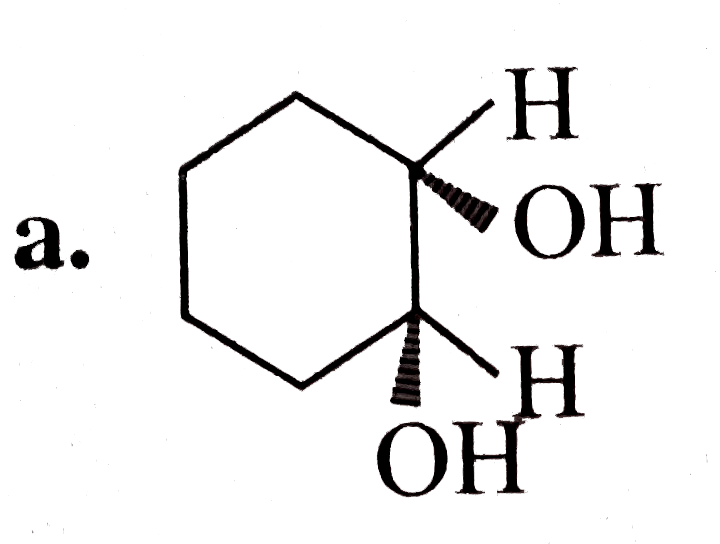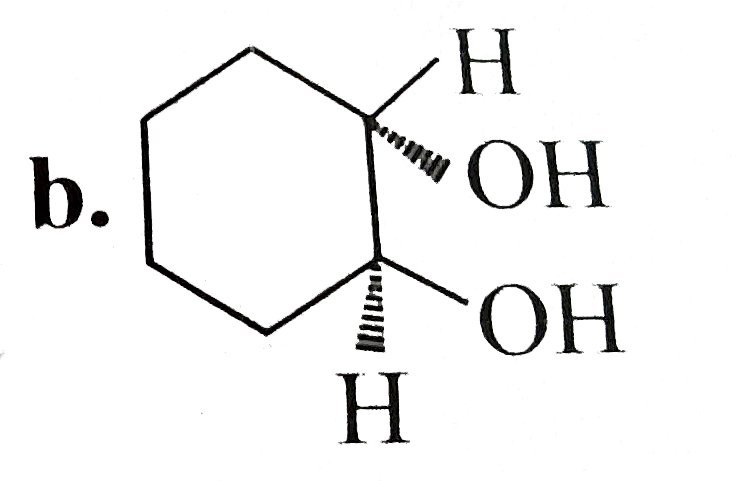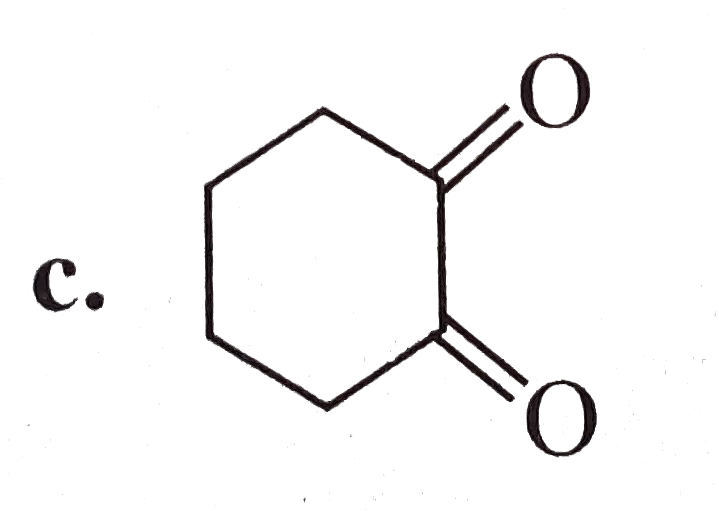Which of the following will undergo periodic oxidation?
a.
b.
c.
d.Glyoxal
The correct Answer is:A, C, D
To determine which of the given compounds will undergo periodic oxidation, we need to identify the presence of a trans-diol structure in the options provided. Periodic oxidation specifically targets trans-diol compounds, converting them into carbonyl compounds.
1. Understanding Periodic Oxidation:
- Periodic oxidation involves the use of periodic acid (HIO4) to oxidize trans-diol compounds into carbonyl compounds.
2. Identifying Diols:
- Diols are organic compounds that contain two hydroxyl (OH) groups attached to adjacent carbon atoms. For periodic oxidation to occur, these OH groups must be in a trans configuration (opposite sides).
3. Analyzing the Options:
- We need to evaluate each option to check if it contains a diol and if that diol is in the trans configuration.
4. Option A:
- If the OH groups in this option are on the same side (cis-diol), it cannot undergo periodic oxidation.
5. Option B:
- If the OH groups are on opposite sides (trans-diol), this compound can undergo periodic oxidation.
6. Option C:
- If this compound is a di-aldehyde or di-carbonyl compound, it cannot undergo periodic oxidation since it does not have the required diol structure.
7. Option D:
- Similar to option C, if this is a di-aldehyde or di-carbonyl compound, it cannot undergo periodic oxidation.
8. Conclusion:
- After evaluating all options, the only compound that meets the criteria for periodic oxidation is option B, which contains a trans-diol.
Final Answer:
- The compound that will undergo periodic oxidation is Option B.
- Periodic oxidation involves the use of periodic acid (HIO4) to oxidize trans-diol compounds into carbonyl compounds.
- Diols are organic compounds that contain two hydroxyl (OH) groups attached to adjacent carbon atoms. For periodic oxidation to occur, these OH groups must be in a trans configuration (opposite sides).
- We need to evaluate each option to check if it contains a diol and if that diol is in the trans configuration.
- If the OH groups in this option are on the same side (cis-diol), it cannot undergo periodic oxidation.
- If the OH groups are on opposite sides (trans-diol), this compound can undergo periodic oxidation.
- If this compound is a di-aldehyde or di-carbonyl compound, it cannot undergo periodic oxidation since it does not have the required diol structure.
- Similar to option C, if this is a di-aldehyde or di-carbonyl compound, it cannot undergo periodic oxidation.
- After evaluating all options, the only compound that meets the criteria for periodic oxidation is option B, which contains a trans-diol.
- The compound that will undergo periodic oxidation is Option B.
Topper's Solved these Questions
- REDUCTION AND OXIDATION REACTION OF ORGANIC COMPOUNDSBOOK - CENGAGE CHEMISTRY ENGLISHCHAPTER - REDUCTION AND OXIDATION REACTION OF ORGANIC COMPOUNDSEXERCISE - Exercise (Single Correct)
90 Videos
- REDUCTION AND OXIDATION REACTION OF ORGANIC COMPOUNDSBOOK - CENGAGE CHEMISTRY ENGLISHCHAPTER - REDUCTION AND OXIDATION REACTION OF ORGANIC COMPOUNDSEXERCISE - Exercise (Assertion And Reasoning)
10 Videos
- REDUCTION AND OXIDATION REACTION OF ORGANIC COMPOUNDSBOOK - CENGAGE CHEMISTRY ENGLISHCHAPTER - REDUCTION AND OXIDATION REACTION OF ORGANIC COMPOUNDSEXERCISE - Exercise (Linked Comprehension)
52 Videos
- QUALITATIVE INORGANIC SALT ANALYSISBOOK - CENGAGE CHEMISTRY ENGLISHCHAPTER - QUALITATIVE INORGANIC SALT ANALYSISEXERCISE - Viva Voce Questions And Part-C (Analysis Of Cations)
42 Videos
- SOLID STATEBOOK - CENGAGE CHEMISTRY ENGLISHCHAPTER - SOLID STATEEXERCISE - Ex 1.2 (Objective)
9 Videos
Similar Questions
Knowledge Check
Which of the following will undergo aldol condensation?
A B
B C
C D
D
Which of the following undergoes meiosis II?
ASecond polar bodyBSpermatogoniaCSecondary oocyteDBoth (a) and (c)Which of the following will undergo fastest elimination with alcoholic KOH?
A B
B C
C D
D
Which of the following will undergo addition reactions ?
View SolutionWhich of the following will undergo meiosis and mitosis both ?
View SolutionWhich of the following function is periodic ?
View SolutionWhich one of the following undergoes meiosis?
View SolutionWhich of the following will not undergo HVZ reaction ?
View Solution
